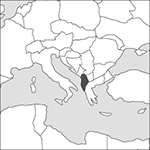
Capital:
Tirana
Area:
28,748 sq km (11,100 sq miles)
Population:
3,002,859 (2012 est)
Currency:
1 lek = 100 qindars
Religions:
Muslim 58.8%; Roman Catholic 10.0%; Eastern Orthodox 6.8%
Ethnic Groups:
Albanian 82.6%; Greek and other minorities
Languages:
Albanian (official); Greek; Macedonian; Romany
International Organizations:
UN; OSCE; Council of Europe; WTO; NATO
A small country in south‐eastern Europe, on the Adriatic coast of the Balkan Peninsula, with Montenegro, Kosovo, and Macedonia to its north and east, and Greece to its south.
Physical
Its coastal plain is marshy in the north but mostly fertile. Inland are rugged mountains, forested hills, and fast‐flowing rivers. It also has the shores of three large lakes within its frontiers.
Economy
Formerly a centrally planned economy under communism, since 1992 Albania has undertaken economic reforms, which include the privatization of farmland, state enterprises, and housing; the abolition of price subsidies; and the liberalization of trade. The economy is primarily agricultural, but crude oil is exported. Industry, which is limited, is in great need of modernization.
History
As part of the Ottoman empire from the 15th century, Albania was noted for the military dictatorship of Ali Pasha (c.1744–1822), whose court was described by the English poet Byron in Childe Harold. Nationalist resistance was crushed in 1831, but discontent persisted and a national league was created during the Russo‐Turkish War of 1877–78. It became an independent state as a result of the Balkan Wars in 1912, and after a brief period as a republic became a monarchy under King Zog in 1928. Invaded by Italy in 1939, it became a Communist state under Enver Hoxha after World War II. Under the strong influence of the Soviet Union until a rift in 1958, it became closely aligned with China until Mao Zedong’s death in 1976. Albania was expelled from the Warsaw Pact in 1968, but remained Stalinist in policy and outlook until the death of Hoxha in 1985. From then on its isolationism began to ease, with cautious steps to restore democracy in 1990. The Communists (renamed the Socialist Party) held power in the first free elections in 1991, but were defeated by the Democratic Party in 1992. Early in 1997 the collapse of several companies involved in pyramid investment schemes triggered anti‐government protests and rioting. A state of emergency was declared, the government resigned, and a Socialist‐led coalition came to power after elections in July 1997. Further rioting broke out in 1998 and a new constitution was established. In 1999 thousands of refugees from Kosovo arrived in the country, putting further pressure on the government. Following elections in 2005, the Socialist‐led government was replaced by a coalition led by the Democratic Party. The Socialists returned to power in 2013. Albania is not expected to join the EU until 2020 at the earliest. It got candidate status in June 2014 - recognition of its progress in reforming institutions to meet EU standards.